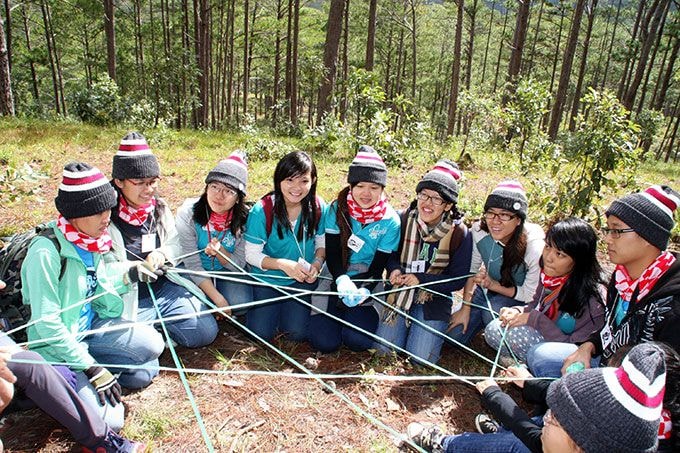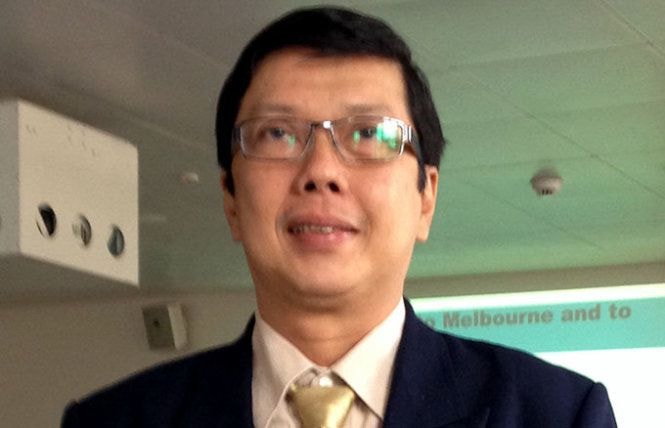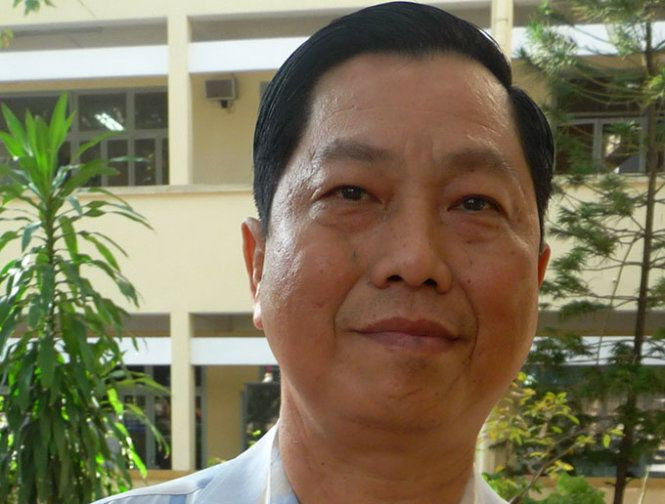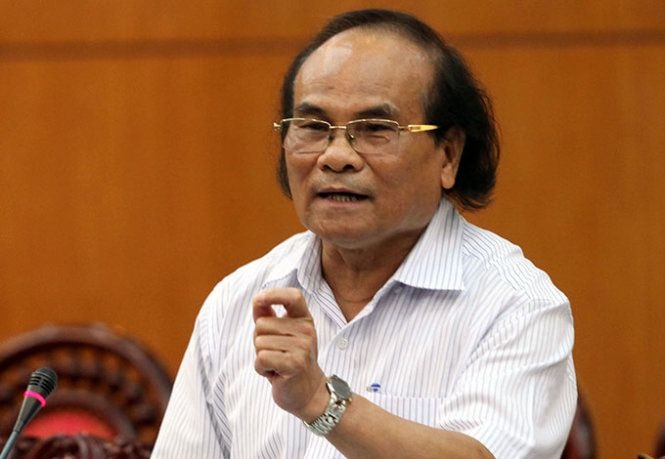High school students will only study 4 compulsory subjects.
According to the latest draft of the general education program, instead of having to study 13 subjects as at present, middle school students will only have to study 7-8 compulsory subjects and 4 subjects for high school students.
The latest draft of the general education program has just been adjusted and completed by the Ministry of Education and Training. According to this draft, instead of students having to study 13 subjects as at present, the number of compulsory subjects will be reduced to only 7-8 subjects for junior high school and 4 subjects for high school.
 |
| Students of some secondary and high schools in Lam Dong province participate in a practical class in the middle of the green forest. According to the draft of the new general education program, the Ministry of Education and Training pays great attention to creative activities and experiences of students - Photo: Phan Thanh |
According to the draft, there will be new subjects integrated from traditional subjects, or renamed to suit changes in content, nature, and educational significance.
Based on the content and requirements of the general education program, schools are allowed to build or request the building of their own education plans in a flexible and adaptable manner, suitable to the specific conditions and circumstances of the locality. This is also suitable in the context of many sets of textbooks - the main documents used in the coming time.
Increasingly optional course content
Speaking to Tuoi Tre, Deputy Minister of Education and Training Nguyen Vinh Hien said: “The subject system in the general education program is designed to ensure balanced content in educational fields, suitable for each level and class, consistent between previous and next classes, strong integration in lower classes, and gradual differentiation in upper classes. The subject system is also adjusted to be compatible with many countries in the world.”
According to the design in the above draft, there are eight areas of education across three levels including language and literature, mathematics, ethics - civics, physical education, arts, social sciences, natural sciences, and technology - information technology.
Each field will have core subjects and will be adjusted according to class and level. For example, the field of science education in grades 1, 2, 3 will have the subject of life around us and in grades 4, 5 will be divided into two subjects: social studies and natural studies, corresponding to two subjects: social sciences (integrating the content of traditional subjects of history, geography) and natural sciences (integrating the content of traditional subjects of physics, chemistry, biology).
If in the basic education stage (primary, secondary school) many traditional subjects are integrated into new subjects, then in high school, some traditional subjects are returned such as physics, chemistry, biology, history, geography, along with many new study topics with high career orientation.
The new point compared to many previous drafts is that at all three levels of education, the subject system is divided into compulsory and elective subjects. In the group of elective subjects, there are also many types: elective subjects that students can choose or not choose; subjects that students are required to choose one or several subjects in the group; content that students can choose in a subject... This elective content will increase gradually from lower to higher grades.
In secondary school, instead of students having to study 13 subjects as at present, the number of compulsory subjects will be reduced significantly, to only 7-8 subjects for junior high school and only 4 subjects for high school. Literature, math, citizenship with the Fatherland and foreign language 1 (chosen by the school) are the four compulsory subjects for high school students. In addition, high school students can choose from subjects, groups of subjects with learning content suitable to their strengths and career orientation.
“In all high schools, students can change their elective subjects and study topics to suit their wishes. However, students will have to complete the minimum number of subjects and study topics according to the program regulations. The program will set aside a certain amount of time to create conditions for students to be able to make this change,” said Deputy Minister Nguyen Vinh Hien.
Emphasize creative experiences
With the orientation of developing students' qualities and abilities, in the orientation of building subject programs, the Ministry of Education and Training also sets out specific requirements, emphasizing teaching methods, focusing on practicality in teaching content and students' experiential activities, depending on the students of each level, depending on the characteristics of each subject to build appropriate subject programs.
For example, in the subject of literature, the teaching method is based on the main principle of learning through activities to encourage and create opportunities for students to read, write, speak, and listen, thereby developing their thinking ability, literary appreciation, and ability to use Vietnamese; encouraging independent and creative thinking, limiting mechanical memorization...
One of the new points noted when building the general education program this time is creative experience activities and scientific and technical research. In which, creative experience activities are for students from grade 1 to grade 12.
This is the way to apply knowledge, skills, and personal experience to solve practical life problems, thereby forming general and specific capacities (organizing activities, managing life, orientation, choosing a career...), promoting each person's own talents.
Creative experiences are emphasized in each subject, and are designed into separate activities to comprehensively apply many fields of knowledge and skills, with a variety of organizational forms and operating methods suitable for different goals.
“If in the basic education stage, creative experiential activities focus on forming qualities, personality, habits, and life skills, then in the career orientation stage, creative experiential activities focus more on requirements related to future careers, students have the opportunity to experience different professions, in many rich forms” - Deputy Minister Hien explained.
Scientific and technical research and implementation of specialized subjects are also stipulated in the general education program. This is also a form of experience, a way for students to apply the synthesis of knowledge from many subjects to create practical products, or solve situations and problems in real life, linking learning with practice.
Organizing learning by topics, learning projects and scientific research helps students form and develop self-study and research capacity, teamwork ability, get used to discussion, debate and know how to present and persuade.
According to Deputy Minister Nguyen Vinh Hien, the highlights of the comprehensive general education program and the orientation of this subject program all come from educational science research, summarizing practices and implementing experiments at schools right in the current general education program.
These include teaching integrated subjects; organizing science and technology competitions, interdisciplinary knowledge application competitions; implementing autonomy in school education plans by proactively designing teaching projects for teachers and students; innovating student assessment methods; innovating classroom organization and management methods in the direction of making students proactive, creative, and self-governing (new school model implemented in primary and secondary schools)...
Invited guest lecturer
The organization of elective teaching is based on the needs of students and the conditions of each school. Schools are allowed to invite guest teachers or send students to study in neighboring schools, groups/classes to increase the ability to meet the needs of students.
According to Deputy Minister Nguyen Vinh Hien, to ensure the program is both stable and developing, after being officially issued, during the implementation process, the program will still receive comments and suggestions from managers, teachers, schools, educational management agencies and interested people. Every year, the Ministry of Education and Training will organize an assessment, consider adjustments if necessary and guide the implementation of adjustments if any.
Implemented in a rolling manner from 2018
School year 2018 - 2019: implementing new textbook program in grades 1, 6, and 10.
School year 2019 - 2020: implemented in grades 2, 7, and 11.
School year 2020 - 2021: implemented in grades 3, 8, and 12.
School year 2021 - 2022: implemented in grades 4 and 9.
School year 2022 - 2023: implemented in grade 5.
Previously, in the history of education, Vietnam has undergone many reforms and innovations in general education programs and textbooks:
The 1950s education reform.
The 1956 reform.
In 1981, the education reform program marked the unification of the general education system across the country with only one program - textbooks.
The first pilot program of division of classes at high school level was in the 1989-1992 school year, the second time was in the 1993-1994 school year.
In 2000-2001, the education and training sector carried out a reform of general education programs and textbooks. In 2002, this program and textbooks were widely deployed nationwide and have lasted until now.
*MSc. Ha Huu Thach (Principal of Giong Ong To High School, District 2, Ho Chi Minh City): Students can easily equip themselves with knowledge for their future careers.
The reduction from the current 13 subjects to 4 compulsory subjects at high school level and 7-8 subjects at middle school level as stated in the draft general education program, in my opinion, is a strong change, a remarkable progress of the Ministry of Education and Training. Because everyone understands that reducing the number of compulsory subjects will help reduce the overload for high school students.
 |
| Mr. Ha Huu Thach |
Retaining the four compulsory subjects of high school, namely literature, mathematics, citizenship and foreign language 1, is also quite suitable for the orientation of the national high school exam. Students can also easily identify and register for elective subjects to serve their future careers.
However, I still wonder whether the subject of Citizenship with the Fatherland is actually a subject of ethics - civic education or not. My opinion is that this subject needs to integrate historical knowledge to meet the educational requirements in the current integration period.
* Mr. Nguyen Quang Minh (teacher at Nguyen Cong Tru High School, Ho Chi Minh City): Reduce academics and theories; increase application and practice
I feel concerned about the content of "high school only has 4 compulsory subjects" as proposed in the draft. At first glance, it seems that reducing the number of subjects will reduce the workload for students. But in reality, the overload is due to the current education program being too academic, heavy on theory, and crammed with too much knowledge. If you really want to reduce the workload, you need to reduce the academic and theoretical aspects, increase the application and practice... so that when students study, they will see that the subject is very useful in life. That way, they will study more easily, comfortably, and enjoyably.
 |
| Mr. Nguyen Quang Minh |
If the regulation for high school level only has 4 compulsory subjects, it will easily lead to a situation where students study lopsidedly, there will be subjects that they will never know about even though life is very necessary. For example, history and geography are very necessary, but I don't understand why they are not included in the list of compulsory subjects or integrated into one of the four compulsory subjects as stated in the draft? Just ask, what kind of person will an engineer or doctor become if he does not know the history of the nation or the geography of the region?
* Professor Dinh Quang Bao (former principal of Hanoi National University of Education): Pedagogical schools must take action.
In order to effectively implement the new general education program, the issue that must be considered from the time of program development is teacher training innovation. One of the new points of the new general education program is integrated teaching (inter-subject and within-subject), while previously teachers were only trained in a single subject. Therefore, teacher training colleges must keep up with the pace to innovate training, providing a new source of teachers to meet this requirement.
 |
| Mr. Dinh Quang Bao |
The shift from mainly imparting knowledge to developing learners' capacity and qualities means that teachers also need to be equipped with a broad knowledge base, be trained more in methods, pedagogical skills, and understand educational psychology... These are issues that pedagogical schools must pay attention to in order to be able to take on the role of training and educating teachers to meet the human resource requirements for the new general education program.
* Mr. Le Ngoc Diep (former head of primary education department, Department of Education and Training, Ho Chi Minh City): Modernity and national identity
The comprehensive general education program is a program of modernity and national identity. For example, the current primary education goal is to develop qualities and abilities and emphasize "the main orientation on family values, clan, homeland, and necessary habits in learning and living".
The direction of developing qualities and capacities for each level of education is also very clear and specific. The qualities of loving life, independent life, responsible life and the capacities of self-study, problem solving and creativity, communication, use of information and communication technology... These are the qualities of Vietnamese people and the capacities of modern Vietnamese people.
According to Tuoi Tre
